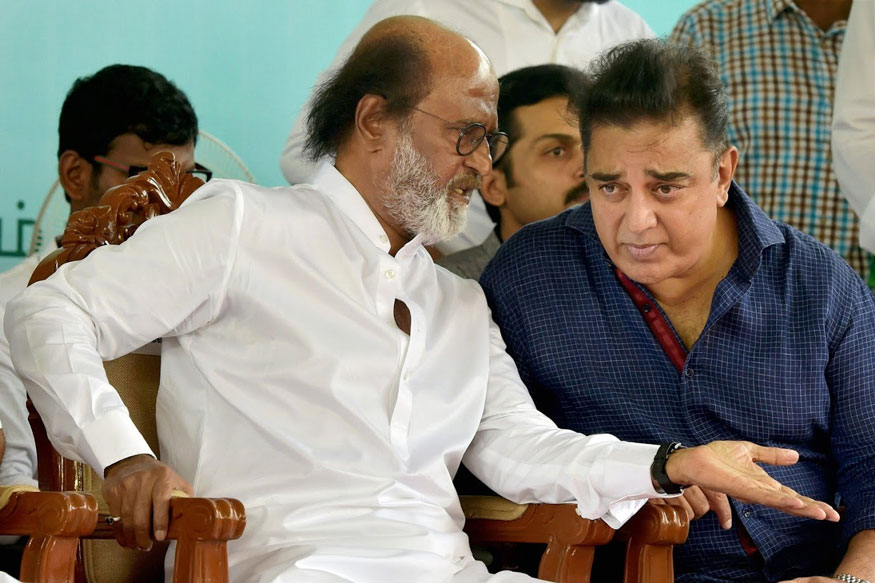Congress vice-president Rahul Gandhi is finally firm in the saddle as the president of the country’s 132-year old political party.
With this, the leadership issue in the Indian National Congress is now settled. Rahul’s aggressive campaigning in Gujarat election revealed that the party is getting its messaging right. However, the most important aspect is to revive the organisation, particularly at the grassroots level, if Congress aspires to take Prime Minister Narendra Modi and BJP head on in the Assembly elections in 2018 and the General Election to Lok Sabha in 2019.
In his first address to a huge gathering at the lawns of AICC headquarters after becoming the Congress president, Rahul on Saturday identified BJP as the biggest enemy.

File image of Congress president Rahul Gandhi. PTI
"Congress took India to the 21st century, but the prime minister (Modi) is taking us backwards, to medieval times, where people are being butchered because of who they are, beaten for what they believe in and killed for what they eat," Rahul said, while attacking Modi and the BJP government.
Immediate challenges
The newly elected Congress president in his speech gave hints on what he wants to do and how he wants to see the party as its chief.
"I want to re-build Congress from 'grand old party' to 'grand old young party’... My responsibility is to safeguard every Congress worker who conveys the message of the party’s ideology in every village," Rahul emphasised.
To make the party ‘grand old young’, Rahul has to use young and energetic workers as foot soldiers while topping it with the experience of the old guard.
After the Central Election Authority of the Congress party officially gave 'certificate of election' to Rahul at the Congress headquarters on Saturday, Firstpost spoke with a host of Congress leaders to find out the immediate challenges before the newly elected president and how they see Rahul in the new role.
"It’s a generational change. Rahul will do much better as party president by bringing new vigour and energy and combining it with the experience of the old guard. Over the years, he has also learnt the tricks of politics," says BK Hariprasad, senior Congress leader and Rajya Sabha Member.
Joined Randeep Singh Surjewala, in-charge communications, AICC, "Unlike BJP, we in Congress don’t retire our veteran leaders; rather use their experience in policy-making. Under Rahul’s leadership, Congress is ready to face all kinds of challenges — from corruption to communalism. We’ll work towards nation building by focussing on the poor, youth, women and the marginalised sections of the society."
The toughest challenge from BJP that Congress faced during consecutive elections was at the grassroots level. The Rashtriya Swayamsevak Sangh (RSS) and its affiliates have always acted as the backbone for BJP in connecting with the masses by strengthening the party's reach at the grassroots level. Whereas, Congress in the past had strong connections at the grassroots level with the help of its front organisations like Seva Dal, which has been missing for a long time.
"Both can’t be compared because Congress didn’t nurture Seva Dal on the lines of the RSS. Instead of following the communal path, Seva Dal is based on Gandhian principles. However, Congress party is present in all the villages of this country and the need of the hour is to strengthen itself at the grassroots level," adds Hariprasad.
Besides connecting to the grassroots, Congress has to revive its other front organisations like students wing NSUI, Youth Congress and the Mahila Congress.
Senior Congress leader Shakeel Ahmed said, "There can’t be any doubt on Rahul's capabilities as (party) president because as Congress vice-president, he led the party from the front whether on the issue of land acquisition bill or the Goods and Services Tax. We’ve seen how aggressively he campaigned in Gujarat. Even as the vice-president, he initiated changes in NSUI, Youth Congress, and the Mahila Congress. And, now his efforts would be to revive these front organisations of Congress and strengthen them by forming new teams of workers."
Apart from restructuring the party at the top, Rahul has a daunting task of building strong leadership in the states and prepare for elections next year in the four big states of Madhya Pradesh, Chhattisgarh, Rajasthan, and Karnataka. The challenge is to contain the infighting and project a strong leadership.
At present, Congress is in power in only five states.
Ajay Singh, Leader of Opposition, Madhya Pradesh Legislative Assembly pointed out, "Considering the state elections in 2018, the time has come to strengthen the party cadre in respective states, especially in Madhya Pradesh and Chhattisgarh. With Rahul as the president, now it will definitely infuse a new energy among party workers to take challenges ahead by building cohesive teams in the states."
Added Ashok Gehlot, former Rajasthan chief minister and also in-charge of Gujarat, “Now under Gandhi’s leadership, new plans will be made for the states, in order to strengthen them.”
What do political analysts say?
Political analysts are of the opinion that Rahul needs to develop his new team, new policies, a new imagination of diversity and a new narrative for young India.
MD Nalapat, political analyst and professor of geopolitics, Manipal University, says, "Indira Gandhi changed the old team in the party after coming to power in 1969 and 1978. Similarly, Rahul needs a new team and a new way of functioning with an eye on the 21st century. He has to be futuristic and bring modernisation for a new India. The names of Jawaharlal Nehru, Indira Gandhi and his father Rajiv Gandhi won’t help and he has to de-link himself from the policies, politics and the personnel of Sonia Gandhi. Rahul has to make an appeal that he’s the future and develop his own kind of policies and politics."
Shiv Visvanathan, social observer, and professor at OP Jindal Global University observed in his article, “Rahul needs a new imagination — a new imagination of diversity, which in many ways was the silent term of the long years of planning. Congress must carry into the BJP ranks a battle for a new idea of (the Indian) culture where diversity is retained and where plurality goes beyond the minoritarian imagination.”
For Rahul to succeed, experts feel that he needs a dollop of good luck, which can come if Modi fails to deliver on his promises.
"What Rahul now needs is luck. Modi’s bad luck in terms of poor handling of socio-political, geopolitical, economic, national security, external and domestic issues, will automatically act as an advantage for Rahul. The 2019 General Election to Lok Sabha will be defining for him against Modi,” Nalapat added.
Published Date: Dec 17, 2017 03:00 pm | Updated Date: Dec 17, 2017 03:00 pm

















